Unit12 课文翻译
现代大学英语精读3(第二版)Unit12课文翻译及课文知识重点
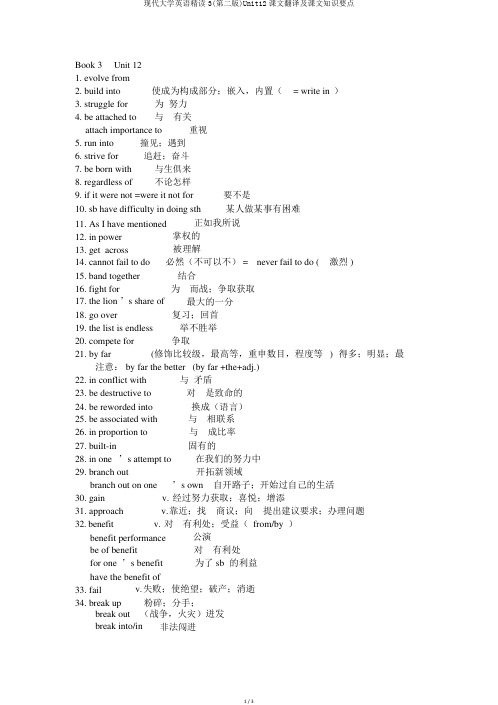
Book 3Unit 121. evolve from2. build into使成为构成部分;嵌入,内置(= write in)3. struggle for为 努力4. be attached to 与 有关attach importance to重视5. run into撞见;遇到6. strive for追赶;奋斗7. be born with与生俱来8. regardless of不论怎样9. if it were not =were it not for要不是10. sb have difficulty in doing sth 某人做某事有困难11. As I have mentioned 正如我所说12. in power 掌权的13. get across 被理解14. cannot fail to do 必然(不可以不) = never fail to do (激烈 )15. band together 结合16. fight for 为 而战;争取获取17. the lion’s share of 最大的一分18. go over 复习;回首19. the list is endless 举不胜举20. compete for 争取21. by far (修饰比较级,最高等,重申数目,程度等 ) 得多;明显;最注意: by far the better (by far +the+adj.)22. in conflict with 与 矛盾23. be destructive to 对 是致命的24. be reworded into 换成(语言)25. be associated with 与 相联系26. in proportion to 与 成比率27. built-in 固有的28. in one’s attempt to 在我们的努力中29. branch out 开拓新领域branch out on one’s own 自开路子;开始过自己的生活30. gain v. 经过努力获取;喜悦;增添31. approach v.靠近;找商议;向提出建议要求;办理问题32. benefit v. 对 有利处;受益( from/by)benefit performance 公演be of benefit 对 有利处for one’s benefit 为了 sb的利益have the benefit of33. fail v.失败;使绝望;破产;消逝34. break up 粉碎;分手;break out (战争,火灾)迸发break into/in非法闯进break through打破,打破,突围35.for the sake of safety 为了安全起见36.call on 呼吁;接见call out 出动,招集;高声叫唤37.stand on the side of 站在 一边;包庇;帮着stand behind做后盾38.get across 超出,渡过(一端到另一端)get through穿过(内部)slip through(从窄缝中)溜过,轻盈地穿过39. look around(round)环视40. in the hope that怀着 希望41. written on被写在 上42. strike out独立闯新路43.contradictory to 与 相矛盾44.share among=divide among 在 之间分派share with sb与 sb 一同分担Translation1.第二次世界大战此后,好多国家一个一个地博得了独立。
电子信息工程专业英语 课文翻译 Unit 12 译文
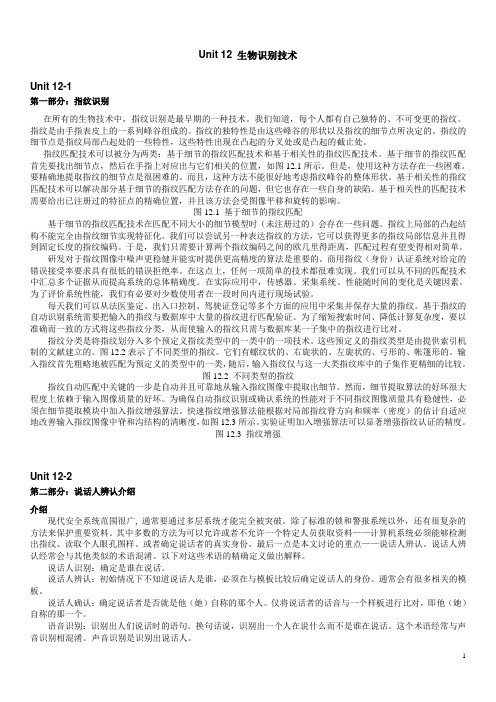
Unit 12 生物识别技术Unit 12-1第一部分:指纹识别在所有的生物技术中,指纹识别是最早期的一种技术。
我们知道,每个人都有自己独特的、不可变更的指纹。
指纹是由手指表皮上的一系列峰谷组成的。
指纹的独特性是由这些峰谷的形状以及指纹的细节点所决定的。
指纹的细节点是指纹局部凸起处的一些特性,这些特性出现在凸起的分叉处或是凸起的截止处。
指纹匹配技术可以被分为两类:基于细节的指纹匹配技术和基于相关性的指纹匹配技术。
基于细节的指纹匹配首先要找出细节点,然后在手指上对应出与它们相关的位置,如图12.1所示。
但是,使用这种方法存在一些困难。
要精确地提取指纹的细节点是很困难的。
而且,这种方法不能很好地考虑指纹峰谷的整体形状。
基于相关性的指纹匹配技术可以解决部分基于细节的指纹匹配方法存在的问题,但它也存在一些自身的缺陷。
基于相关性的匹配技术需要给出已注册过的特征点的精确位置,并且该方法会受图像平移和旋转的影响。
图12.1 基于细节的指纹匹配基于细节的指纹匹配技术在匹配不同大小的细节模型时(未注册过的)会存在一些问题。
指纹上局部的凸起结构不能完全由指纹细节实现特征化。
我们可以尝试另一种表达指纹的方法,它可以获得更多的指纹局部信息并且得到固定长度的指纹编码。
于是,我们只需要计算两个指纹编码之间的欧几里得距离,匹配过程有望变得相对简单。
研发对于指纹图像中噪声更稳健并能实时提供更高精度的算法是重要的。
商用指纹(身份)认证系统对给定的错误接受率要求具有很低的错误拒绝率。
在这点上,任何一项简单的技术都很难实现。
我们可以从不同的匹配技术中汇总多个证据从而提高系统的总体精确度。
在实际应用中,传感器、采集系统、性能随时间的变化是关键因素。
为了评价系统性能,我们有必要对少数使用者在一段时间内进行现场试验。
每天我们可以从法医鉴定、出入口控制、驾驶证登记等多个方面的应用中采集并保存大量的指纹。
基于指纹的自动识别系统需要把输入的指纹与数据库中大量的指纹进行匹配验证。
(完整版)Unit12GenderBiasinLanguage课文翻译综合教程一

Unit 12 Gender Bias in LanguageLanguage is a very powerful element. It is the most common method of communication. Yet it is often misunderstood and misinterpreted, for language is a very complicated mechanism with a great deal of nuance. There are times when in conversation with another individual, that we must take into account the person’s linguistic genealogy. There are people who use language that would be considered prejudicial or biased in use. But the question that is raised is in regard to language usage: Is language the cause of the bias or is it reflective of the preexisting bias that the user holds? There are those who believe that the language that we use in day-to-day conversation is biased in and of itself. They feel that the term "mailman", for example, is one that excludes women mail carriers. Then there are those who feel that language is a reflection of the prejudices that people have within themselves. That is to say, the words that people choose to use in conversation denote the bias that they harbor within their own existence.There are words in the English language that are existing or have existed (some of them have changed with the new wave of “political correctness” coming about) that have inherently been sexually biased against women. For example, the person who investigates reported complaints (as from consumers or students), reports findings, and helps to achieve fair and impartial settlements is ombudsman (Merriam-Webster Dictionary), but ombudsperson here at Indiana State University. This is an example of the gender bias that exists in the English language. The language is arranged so that men are identified with exalted positions, and women are identified with more service-oriented positions in which they are being dominated and instructed by men. So the language used to convey this type of male supremacy is generally reflecting the honored position of the male and the subservience of the female. Even in relationships, the male in the home is often referred to as the “man of the house,” even if it is a 4-year-old child. It is highly insulting to say that a 4-year-old male, based solely on his gender, is more qualified and capable of conducting the business and affairs of the home than his possibly well-educated, highly intellectual mother. There is a definite disparity in that situation.In American culture, a woman is valued for the attractiveness of her body, while a man is valued for his physical strength and his achievements. Even in the example of word pairs the bias is evident. The masculine word is put before the feminine word, as in the examples of Mr. and Mrs., his and hers, boys and girls, men and women, kings and queens, brothers and sisters, guys and dolls, and host and hostess. This shows that the usage of many of the English words is also what contributes to the bias present in the English language.Alleen Pace Nilsenn notes that there are instances when women are seen as passive while men are active and bring things into being. She uses the example of the wedding ceremony. In the beginning of the ceremony, the father is asked who gives the bride away and he answers, “I do.” It is at this point that Nilsen argues that the gender bias comes into play. The traditional concept of the bride as something to be handed from one man (the father) to another man (the husband-to-be) is perpetuated. Another example is in the instance of sexual relationships. The women becomebrides while men wed women. The man takes away a woman’s virginity and a woman loses her virginity. This denotes her inability, apparently due to her gender, to hold on to something that is a part of her, thus enforcing the man’s ability and right to claim something that is not his.To be a man, according to some linguistic differences, would be considered an honor. To be endowed by genetics with the encoding of a male would be as having been shown grace, unmerited favor. There are far greater positive connotations connected with being a man than with being a woman. Nilsen yields the example of “shrew” and “shrewd.” The word “shrew” is taken from the name of a small but especially vicious animal; however in Nilsen’s dictionary, a “shrew” was identified as an “ill-tempered, scolding woman.” However, the word “shrewd,” which comes from the same root, was defined as “marked by clever discerning awareness.” It was noted in her dictionary as a shrewd businessman. It is also commonplace not to scold little girls for being “tomboys” but to scoff at little boys who play with dolls or ride girls’ bicycles.In the conversations that come up between friends, you sometimes hear the words “babe,” “broad,” and “chick.” These are words that are used in reference to or directed toward women. It is certainly the person’s right to use these words to reflect women, but why use them when there are so many more to choose from? Language is the most powerful tool of communication and the most effective tool of communication. It is also the most effective weapon of destruction.Although there are biases that exist in the English language, there has been considerable change toward recognizing these biases and making the necessary changes formally so that they will be implemented socially. It is necessary for people to make the proper adjustments internally to use appropriate language to effectively include both genders. We qualify language. It is up to us to decide what we will allow to be used and made proper in the area of language.语言中的性别偏见语言是一个非常强大的元素。
九年级英语Unit12 课文翻译
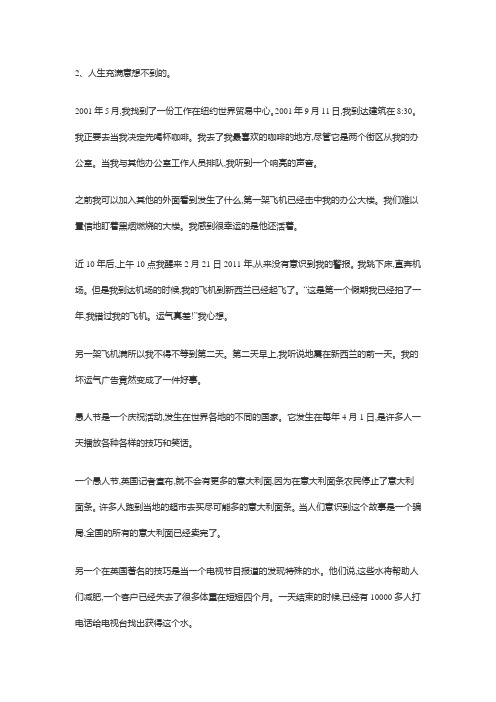
2、人生充满意想不到的。
2001年5月,我找到了一份工作在纽约世界贸易中心。
2001年9月11日,我到达建筑在8:30。
我正要去当我决定先喝杯咖啡。
我去了我最喜欢的咖啡的地方,尽管它是两个街区从我的办公室。
当我与其他办公室工作人员排队,我听到一个响亮的声音。
之前我可以加入其他的外面看到发生了什么,第一架飞机已经击中我的办公大楼。
我们难以置信地盯着黑烟燃烧的大楼。
我感到很幸运的是他还活着。
近10年后,上午10点我醒来2月21日2011年,从来没有意识到我的警报。
我跳下床,直奔机场。
但是我到达机场的时候,我的飞机到新西兰已经起飞了。
“这是第一个假期我已经拍了一年,我错过我的飞机。
运气真差!”我心想。
另一架飞机满所以我不得不等到第二天。
第二天早上,我听说地震在新西兰的前一天。
我的坏运气广告竟然变成了一件好事。
愚人节是一个庆祝活动,发生在世界各地的不同的国家。
它发生在每年4月1日,是许多人一天播放各种各样的技巧和笑话。
一个愚人节,英国记者宣布,就不会有更多的意大利面,因为在意大利面条农民停止了意大利面条。
许多人跑到当地的超市去买尽可能多的意大利面条。
当人们意识到这个故事是一个骗局,全国的所有的意大利面已经卖完了。
另一个在英国著名的技巧是当一个电视节目报道的发现特殊的水。
他们说,这些水将帮助人们减肥,一个客户已经失去了很多体重在短短四个月。
一天结束的时候,已经有10000多人打电话给电视台找出获得这个水。
许多愚人节笑话可能会不是很有趣。
一位著名的电视明星曾经邀请他的女朋友在他的节目在愚人节。
他向她求婚。
这位女士很高兴,因为她真的很想结婚。
然而,当她说“是”,他回答,“四月傻瓜!“这个小笑话没有一个非常幸福的结局。
那个电视明星既失去了他的女朋友和他的节目。
世界上最著名的技巧之一,然而,而不是4月10月发生。
在1938年的那个月,演员奥森·威尔斯在他的广播节目上宣布外星人从火星落在地上。
他描述了他们在哪里降落,并告诉他们如何穿越美国。
人教版九年级下册英语Unit12SectionB课文翻译.doc

人教版九年级下册英语Unit12SectionB课文翻译人教版九年级下册英语Unit12SectionB课文翻译人教版九年级下册英语Unit12 SectionB课文翻译:2a 部分翻译Have you ever played jokes on others, especially on April Fool s Day? Have you ever been fooled by others? Tell your story to your partner.你曾经捉弄过别人吗,特别是在愚人节这天?你曾经被别人捉弄过吗?向你的同伴讲述你的故事。
人教版九年级下册英语Unit12 SectionB课文翻译:2b 部分翻译Read the passage quickly.Then match each paragraph with the main idea.快速阅读文章。
然后把每一段和中心意思搭配起来。
Paragraph 1 The most famous trick played第一段最著名的恶作剧Paragraph 2 Examples of funny stories that happened on April Fool s Day第二段发生在愚人节的有趣的故事的例子Paragraph 3 An introduction to April Fool s Day第三段愚人节的介绍Paragraph 4 A sad story that happened on April Fool s Day第四段发生在愚人节的一个伤心的故事USING BACKGROUND KNOWLEDGE运用背景知识Carefully reading the first sentence in each paragraph can activate your own knowledge of the topic and help you guess what the whole text is about.认真阅读每一段的第一句可以激活你自己对于这一话题的知识,并且帮助你猜测整篇文章的内容。
unit12课文翻译microsoftword文档

弗劳伦斯.南丁格尔的故事Florence Nightingale was born in Italy on 12 May 1820 and was named Florence after her birthplace. Florence and her sister were educated by their father and private teachers. She excelled in her studies. When she grew up , she decided to become a nurse. This decision greatly upset her family, because at that time nurses in England were looked down upon by people. But she was determined, and began caring for the sick in hospitals.弗劳伦斯.南丁格尔于1820年5月12日出生在意大利,并以他的出生地命名。
其父亲和私人教师教弗劳伦斯.南丁格尔和她的妹妹学习。
她学业优秀。
长大后,她决定做一名护士,这个决定令她的家人很不安。
因为在当时的英国,护士这个职业被别人看不起。
但是,她已下定决心,并开始在医院护理病患。
In 1854 ,England was fighting a war with Russia in Turkey .At the front many British soldiers were wounded or sick. The wounded soldiers lay on the hard floors of a dirty army hospital. In the evening, the tried to sleep, but rats ran over their bodies. The conditions for them were terrible.1854年,英国与俄国在土耳其交战,很多英国士兵在前线受伤或患病,伤兵们躺在肮脏的军队医院里坚硬的地板上。
英语泛读教程3第三册课文翻译UNIT12
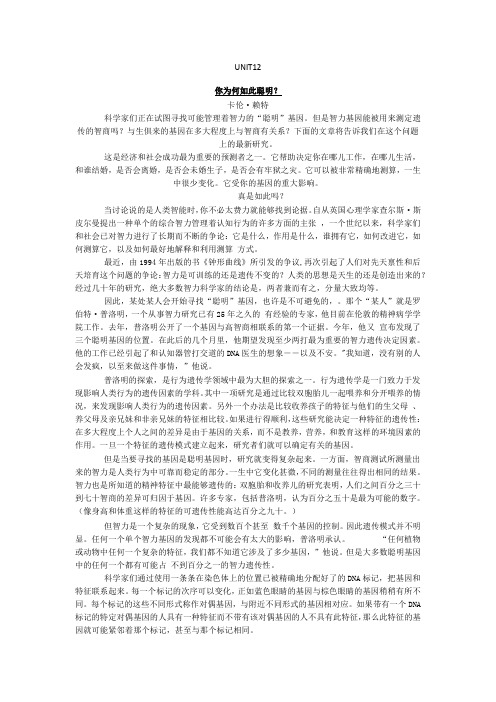
UNIT12你为何如此聪明?卡伦·赖特科学家们正在试图寻找可能管理着智力的“聪明”基因。
但是智力基因能被用来测定遗传的智商吗?与生俱来的基因在多大程度上与智商有关系?下面的文章将告诉我们在这个问题上的最新研究。
这是经济和社会成功最为重要的预测者之一。
它帮助决定你在哪儿工作,在哪儿生活,和谁结婚,是否会离婚,是否会未婚生子,是否会有牢狱之灾。
它可以被非常精确地测算,一生中很少变化。
它受你的基因的重大影响。
真是如此吗?当讨论说的是人类智能时,你不必太费力就能够找到论据。
自从英国心理学家查尔斯·斯皮尔曼提出一种单个的综合智力管理着认知行为的许多方面的主张,一个世纪以来,科学家们和社会已对智力进行了长期而不断的争论:它是什么,作用是什么,谁拥有它,如何改进它,如何测算它,以及如何最好地解释和利用测算方式。
最近,由1994年出版的书《钟形曲线》所引发的争议,再次引起了人们对先天禀性和后天培育这个问题的争论:智力是可训练的还是遗传不变的?人类的思想是天生的还是创造出来的?经过几十年的研究,绝大多数智力科学家的结论是,两者兼而有之,分量大致均等。
因此,某处某人会开始寻找“聪明”基因,也许是不可避免的,。
那个“某人”就是罗伯特·普洛明,一个从事智力研究已有25年之久的有经验的专家,他目前在伦敦的精神病学学院工作。
去年,普洛明公开了一个基因与高智商相联系的第一个证据。
今年,他又宣布发现了三个聪明基因的位置。
在此后的几个月里,他期望发现至少两打最为重要的智力遗传决定因素。
他的工作已经引起了和认知器管打交道的DNA医生的想象――以及不安。
"我知道,没有别的人会发疯,以至来做这件事情,”他说。
普洛明的探索,是行为遗传学领域中最为大胆的探索之一。
行为遗传学是一门致力于发现影响人类行为的遗传因素的学科。
其中一项研究是通过比较双胞胎儿一起喂养和分开喂养的情况,来发现影响人类行为的遗传因素。
高级英语2课文翻译book2unit12

第十二课一个发现:做一个美国人意味着什么詹姆斯·鲍德温1.亨利·詹姆斯曾经说过,“身为一个美国人是一种复杂玄妙的命运。
”而一位作家在欧洲做出的最重大的发现就是这种命运究竟复杂到何种程度。
美国的历史,其远大志向,其不同凡响的辉煌成就,还有她那更加不同凡响的挫折失败,以及她在世界上的地位——不论是过去还是现在——都是那么深不可测而又无可更改地独一无二,以至于“美国”这个词至今仍是一个陌生的、几乎可以说是完全没有明确定义的、且具有极大争议性的专有名词。
世界上似乎还没有人确切地知道这个词的含义,就连我们这些五颜六色、千千万万自称为美国人的人也不例外。
2.我当初离开美国是因为我曾怀疑自己能否经受住这儿的有色人种问题的狂风暴雨的冲击。
(现在我仍然时不时地这样怀疑。
)我想使自己不至于仅仅成为一个黑人,或是仅仅只成为一个黑人作家。
我想寻求一种什么途径,来使自己的生活经历的特殊性把自己与他人联系起来而不是分离开来。
(我同黑人之间也产生了隔阂,就像我同白人之间的隔阂一样严重,当一个黑人开始真正地相信白人对黑人的评价时,常常就会发生这样的情况。
) 3.在我认为有必要去寻求一种能把我的生活经历同别的人——黑人和白人,作家和非作家——的生活经历联系起来的途径的过程中,我惊奇地发现:自己原来也同任何得克萨斯州士兵一样,是非常爱国的美国人。
而且我发现,我在巴黎所认识的每一位美国作家都有我这种感受。
他们都同我一样脱离了自己的本源,而且事实证明,这些美国白人的欧洲本源同我的非洲本源竟没有多少差别——他们在欧洲也像我一样感到不自在。
4.我是奴隶的后代,而他们是自由人的子孙,这种差异则无关紧要。
因为我们在欧洲大地上相遇时,都在努力探求着各自的自我价值。
当我们终于发现各自的自我价值之后,我们似乎都在感慨:这下可好啦,多少年来造成我们之间的隔阂的遗憾和痛苦之情,我们可再也不用死抱住不放了。
5.我们美国人彼此间的相互了解超过任何欧洲人所能达到的程度。
unit12课文翻译Microsoft Word 文档
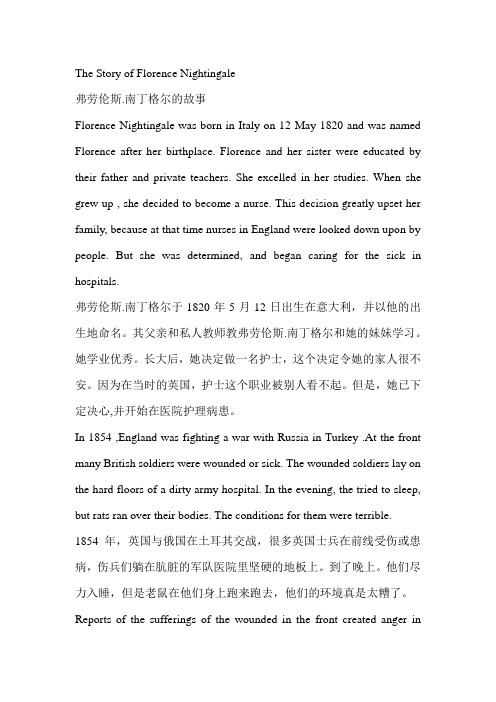
The Story of Florence Nightingale弗劳伦斯.南丁格尔的故事Florence Nightingale was born in Italy on 12 May 1820 and was named Florence after her birthplace. Florence and her sister were educated by their father and private teachers. She excelled in her studies. When she grew up , she decided to become a nurse. This decision greatly upset her family, because at that time nurses in England were looked down upon by people. But she was determined, and began caring for the sick in hospitals.弗劳伦斯.南丁格尔于1820年5月12日出生在意大利,并以他的出生地命名。
其父亲和私人教师教弗劳伦斯.南丁格尔和她的妹妹学习。
她学业优秀。
长大后,她决定做一名护士,这个决定令她的家人很不安。
因为在当时的英国,护士这个职业被别人看不起。
但是,她已下定决心,并开始在医院护理病患。
In 1854 ,England was fighting a war with Russia in Turkey .At the front many British soldiers were wounded or sick. The wounded soldiers lay on the hard floors of a dirty army hospital. In the evening, the tried to sleep, but rats ran over their bodies. The conditions for them were terrible. 1854年,英国与俄国在土耳其交战,很多英国士兵在前线受伤或患病,伤兵们躺在肮脏的军队医院里坚硬的地板上。
九年级英语unit12课文翻译

九年级英语unit12课文翻译Section A 2d马特:凯文,为什么你今天迟到了?凯文:我的闹钟没有响!我一直睡觉,当我醒来时,已经是早上8点了!马特:噢!,不!凯文:所以我迅速穿上衣服冲出家门。
马特:你没吃早饭吗?凯文:没有,我甚至没有刷牙也没有洗脸!但在我到达车站前,汽车已经开走了。
马特:那你是怎么来这儿的?凯文:幸运的是,卡尔的父亲看见我在路上,让我打了他的车。
马特:嗯,至少当你到达学校时,上课只迟到5分钟。
Section A 3a生活充满了意外2023年5月,我在纽约世贸中心找到一份工作。
在2023年9月11日,我大约在早上八点半到达了工作的大楼,这时我决定先买一杯咖啡。
我去了我最喜欢的咖啡店,虽然它在我办公室东边的两个街区以外。
当我正在和其他办公室工作职员排队等候的时候,听到____。
我还没来得及参加屋外的人群弄清终究发生了什么事,第一架飞机已经撞上了我办公室的大楼。
我们直愣愣盯着燃烧着的大楼上升起的黑烟,无法相信〔这一切〕。
我觉着我可以活着很幸运。
大约10年之后,2023年2月21日,我早上10:00 醒来意识到我的闹钟根本没响。
我从床上跳起来直奔机场。
但是当我到达机场时,我飞往新西兰的航班已经起飞了。
“这可是我今年的第一个假期,我居然误了航班。
真倒霉!”我暗想。
其他的航班都已经满员,我不得不等到第二天。
〔结果〕第二天早上,我听到新西兰昨天发生了地震。
我的坏运气意想不到变成了一件好事。
Section B 2b愚人节是一个世界上许多不同国家都进展庆贺的节日。
它在每年的四月一日,这是一个许多人会互相开各种玩笑或恶作剧的日子。
有一年的愚人节,英国的一位记者声称因为意大利农民停顿种植意大利面条,因此以后将不再有意大利面条了。
许多人都跑到当地超市尽可能多地买意大利面。
等人们意识到这是一个恶作剧的时候,全国所有的意大利面条都被卖光了。
在英国另一个恶作剧中,一电视节目报道发现了一种特殊的水。
他们说这种水可以帮助人们减肥,有一位消费者仅四个月就减掉了很多体重。
Unit 12 “Take Over, Bos’n!”课文翻译综合教程三
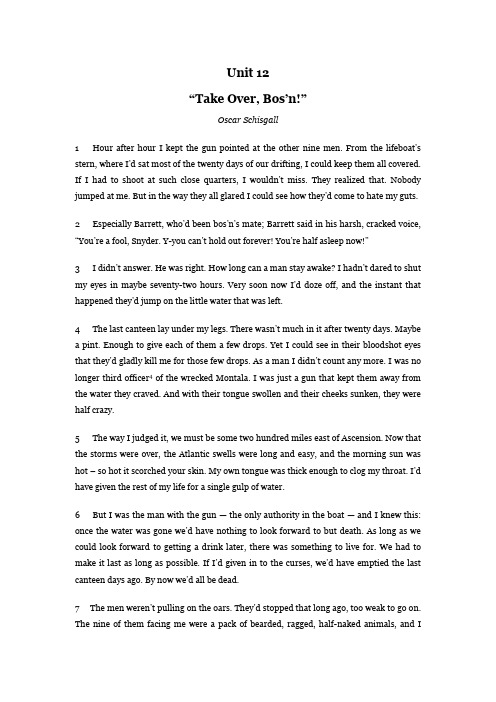
Unit 12“Take Over, Bos’n!”Oscar Schisgall1 Hour after hour I kept the gun pointed at the other nine men. From the lifeboat’s stern, where I’d sat most of the twenty days of our drifting, I could keep them all covered. If I had to shoot at such close qu arters, I wouldn’t miss. They realized that. Nobody jumped at me. But in the way they all glared I could see how they’d come to hate my guts.2 Especially Barrett, who’d been bos’n’s mate; Barrett said in his harsh, cracked voice, “You’re a fool, Snyder. Y-you can’t hold out forever! You’re half asleep now!”3 I didn’t answer. He was right. How long can a man stay awake? I hadn’t dared to shut my eyes in maybe seventy-two hours. Very soon now I’d doze off, and the instant that happened they’d jump on the li ttle water that was left.4 The last canteen lay under my legs. There wasn’t much in it after twenty days. Maybea pint. Enough to give each of them a few drops. Yet I could see in their bloodshot eyes that they’d gladly kill me for those few drops. As a man I didn’t count any more. I was no longer third officer4 of the wrecked Montala. I was just a gun that kept them away from the water they craved. And with their tongue swollen and their cheeks sunken, they were half crazy.5 The way I judged it, we must be some two hundred miles east of Ascension. Now that the storms were over, the Atlantic swells were long and easy, and the morning sun was hot –so hot it scorched your skin. My own tongue was thick enough to clog my throat. I’d have given the rest of my life for a single gulp of water.6 But I was the man with the gun — the only authority in the boat — and I knew this: once the water was gone we’d have nothing to look forward to but death. As long as we could look forward to getting a drink later, there was something to live for. We had to make it last as long as possible. If I’d given in to the curses, we’d have emptied the last canteen days ago. By now we’d all be dead.7 The men weren’t pulling on the oars. They’d stopped that long ago, too weak to go o n. The nine of them facing me were a pack of bearded, ragged, half-naked animals, and Iprobably looked as bad as the rest. Some sprawled over the gunwales, dozing. The rest watched me as Barrett did, ready to spring the instant I relaxed.8 When they were n’t looking at my face they looked at the canteen under my legs.9 Jeff Barrett was the nearest one. A constant threat. The bos’n’s mate was a heavy man, bald, with a scarred and brutal face. He’d been in a hundred fights, and they’d left their marks on him.10 Barrett had been able to sleep —in fact, he’d slept through most of the night – and I envied him that. His eyes wouldn’t close. They kept watching me, narrow and dangerous.11 Every now and then he taunted me in that hoarse, broken voice:12 “Why don’t you quit? You can’t hold out!”13 “Tonight,” I said. “We’ll ration the rest of the water tonight.”14 “By tonight some of us’ll be dead! We want it now!”15 “Tonight ,” I said.16 Couldn’t he understand that if we waited until night the few drops wouldn’t be sweated out of us so fast? But Barrett was beyond all reasoning. His mind had already cracked with thirst. I saw him begin to rise, a calculating look in his eyes. I aimed the gun at his chest – and he sat down again.17 I’d grabbed my Luger on inst inct, twenty days ago, just before running for the lifeboat. Nothing else would have kept Barrett and the rest away from the water.18 These fools —couldn’t they see I wanted a drink as badly as any of them? But I was in command here — that was the difference. I was the man with the gun, the man who had to think. Each of the others could afford to think only of himself; I had to think of them all.19 Barrett’s eyes kept watching me, waiting. I hated him. I hated him all the more because he’d slept. He had that advantage now. He wouldn’t keel over.20 And long before noon I knew I couldn’t fight any more. My eyelids were too heavy to lift. As the boat rose and fell on the long swells, I could feel sleep creeping over me like paralysis. I bent my head. It fil led my brain like a cloud. I was going, going …21 Barrett stood over me, and I couldn’t even lift the gun. In a vague way I could guess what would happen. He’d grab the water first and take his drop. By that time the others would be screaming and tearing at him, and he’d have to yield the canteen. Well, there was nothing more I could do about it.22 I whispered, “Take over, bos’n.”23 Then I fell face down in the bottom of the boat. I was asleep before I stopped moving…24 When a hand shook my shoulder, I could hardly raise my head. Jeff Barrett’s hoarse voice said, “Here! Take your share o’ the water!”25 Somehow I propped myself up on my arms, dizzy and weak. I looked at the men, andI thought my eyes were going. Their figures were dim, shadowy; but then I realized it wasn’t because of my eyes. It was night. The sea was black; there were stars overhead, I’d slept the day away.26 So we were in our twenty-first night adrift —the night in which the tramp Croton finally picked us up – but now, as I turned my head to Barrett there was no sign of any ship. He knelt beside me, holding out the canteen, his other hand with gun steady on the men.27 I stared at the canteen as if it were a mirage. Hadn’t they finished that pint of water this morning? When I looked u p at Barrett’s ugly face, it was grim. He must have guessed my thoughts.28 “You said, ‘Take over, bos’n,’ didn’t you?” he growled. “I’ve been holding off these apes all day.” He hefted the Luger in his hand. “When you’re boss-man,” he added, “in command and responsible for the rest — you —you sure get to see things different, don’t you?”“水手长,接手吧!”奥斯卡·希斯高尔1. 一小时又一小时,我用枪指着其他九个人。
(完整word版)unit12课文翻译MicrosoftWord文档
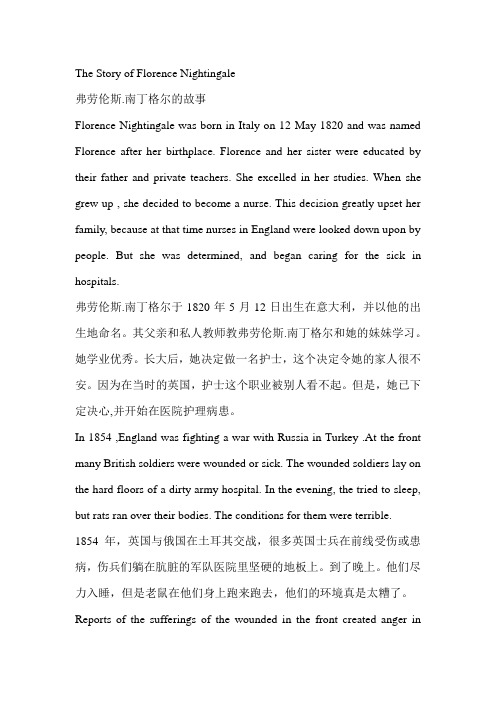
The Story of Florence Nightingale弗劳伦斯.南丁格尔的故事Florence Nightingale was born in Italy on 12 May 1820 and was named Florence after her birthplace. Florence and her sister were educated by their father and private teachers. She excelled in her studies. When she grew up , she decided to become a nurse. This decision greatly upset her family, because at that time nurses in England were looked down upon by people. But she was determined, and began caring for the sick in hospitals.弗劳伦斯.南丁格尔于1820年5月12日出生在意大利,并以他的出生地命名。
其父亲和私人教师教弗劳伦斯.南丁格尔和她的妹妹学习。
她学业优秀。
长大后,她决定做一名护士,这个决定令她的家人很不安。
因为在当时的英国,护士这个职业被别人看不起。
但是,她已下定决心,并开始在医院护理病患。
In 1854 ,England was fighting a war with Russia in Turkey .At the front many British soldiers were wounded or sick. The wounded soldiers lay on the hard floors of a dirty army hospital. In the evening, the tried to sleep, but rats ran over their bodies. The conditions for them were terrible. 1854年,英国与俄国在土耳其交战,很多英国士兵在前线受伤或患病,伤兵们躺在肮脏的军队医院里坚硬的地板上。
Unit 12 Clothes Make the Man 课文翻译

Unit 12Clothes Make the Man — UneasyAnne Hollander1. The last decade has made a large number of men more uneasy about what to wear than they might ever have believed possible. The idea that one might agonize over whether to grow sideburns or wear trousers of a radically different shape had never occurred to a whole generation. Before the mid '60s whether to wear a tie was the most dramatic sartorial problem: everything else was a subtle matter of surface variation. Women have been so accustomed to dealing with extreme fashion for so long that they automatically brace themselves for whatever is coming next, including their own willingness to resist or conform and all the probable masculine responses. Men in modern times have only lately felt any pressure to pay that kind of attention. All the delicate shades of significance expressed by the small range of possible alternatives used to be absorbing enough: Double- or single-breasted cut? Sports jacket and slacks or a suit? Shoes with plain or wing tip? The choices men had had to make never looked very momentous to a feminine eye accustomed to a huge range of personally acceptable possibilities, but they always had an absolute and enormous meaning in the world of men, an identifying stamp usually incomprehensible to female judgment. A hat with a tiny bit of nearly invisible feather was separated as by an ocean from a hat with none, and white-on-white shirts, almost imperceptibly complex in weave, were totally shunned by those men who favored white oxford-cloth shirts. Women might remain mystified by the ferocity with which men felt and supported these tiny differences, and perhaps they might pity such narrow sartorial vision attaching so much importance to half an inch of padding in the shoulders or an inch of trouser cuff.2. But men knew how lucky they were. It was never very hard to dress the part of oneself. Even imaginative wives and mothers could eventually be trained to reject all seductive but incorrect choices with respect to tie fabric and collar shape that might connote the wrong flavor of spiritual outlook, the wrong level of education, or the wrong sort of male bonding. It was a well ordered world, the double standard flourished without hindrance, and no man who stuck to the rules ever needed to suspect that he might look ridiculous.3. Into this stable system the width-of-tie question erupted in the early '60s. Suddenly, and for the first time in centuries, the rate of change in masculine fashion accelerated with disconcerting violence, throwing a new light on all the steady old arrangements.Women looked on with secret satisfaction, as it became obvious that during the next few years men might think they could resist the changes, but they would find it impossible to ignore them. In fact to the discomfiture of many, the very look of having ignored the changes suddenly became a distinct and highly conspicuous way of dressing, and everyone ran for cover. Paying no attention whatever to nipped-in waistlines, vivid turtlenecks, long hair with sideburns, and bell-bottom trousers could not guarantee any comfy anonymity, but rather stamped one as a convinced follower of the old order -- thus adding three or four dangerous new meanings to all the formerly reliable signals. A look in the mirror suddenly revealed man to himself wearing his obvious chains and shackles, hopelessly unliberated.4. In general, men of all ages turn out not to want to give up the habit of fixing on a suitable self-image and then carefully tending it, instead of taking up all the new options. It seems too much of a strain to dress for all that complex multiple role-playing, like women. The creative use of male plumage for sexual display, after all, has had a very thin time for centuries: the whole habit became the special prerogative of certain clearly defined groups, ever since the overriding purpose of male dress had been established as that of precise identification. No stepping over the boundaries was thinkable -- ruffled evening shirts were for them, not me; and the fear of the wrong associations was the strongest male emotion about clothes, not the smallest part being fear of association with the wrong sex.5. The difference between men's and women's clothes used to be an easy matter from every point of view, all the more so when the same tailors made both. When long ago all elegant people wore brightly colored satin, lace, and curls, nobody had any trouble sorting out the sexes or worrying whether certain small elements were sexually appropriate. So universal was the skirted female shape and the bifurcated male one that a woman in men's clothes was completely disguised, and long hair or gaudy trimmings were never the issue. It was the 19th century, which produced the look of the different sexes coming from different planets, that lasted such a very long time. It also gave men official exemption from fashion risk, and official sanction to laugh at women for perpetually incurring it.6. Women apparently love the risk, of course, and ignore the laughter. Men secretly hate it and dread the very possibility of a smile. Most of them find it impossible to leap backward across the traditional centuries into a comfortable renaissance zest for these dangers, since life is hard enough now anyway. Moreover, along with fashion came the pitiless exposure of masculine narcissism and vanity, so long submerged and undiscussed. Men had lost the habit of having their concern with personal appearance show asblatantly as women's -- the great dandies provided no continuing tradition, except perhaps among urban blacks. Men formerly free from doubt wore their new finery with colossal self-consciousness, staring covertly at everyone else to find out what the score really was about all this stuff. High heels and platform soles, once worn by the Sun King and other cultivated gentlemen of the past, have been appropriated only by those willing to change not only their heights but their way of walking. They have been ruled out, along with the waist-length shirt opening that exposes trinkets nestling against the chest hair, by men who nevertheless find themselves willing to wear long hair and fur coats and carry handbags. Skirts, I need not add, never caught on.1. 过去的十年里,为了穿什么衣服,戴什么饰品许多男士感到很不自在,连他们自己都不曾相信过会有这种可能。
5B课文翻译

5B英语Unit1-Unit12课文翻译1、Tidy up!(1)A: look at your bedroom .What a mess!Let's tidy it up.看看你们的卧室。
真是一团糟!让我们把它整理好吧。
B: Sure,Sally . 当然可以,萨莉。
A: Whose socks are those? Are they yours,Peter? 那些是谁的短袜?它们是你的吗,彼得?B: No,they aren't. They're Paul's . 不,它们不是。
它们是保罗的。
A: Can you put them on his bed ? 你能把它们放到他的床上吗?B: Sure. 当然可以。
(2)A: Whose cap is this? 这是谁的帽子?B: It's mine. 它是我的。
A: There is a T-shirt. Is this yours too,Peter? 有一件T恤衫。
这也是你的吗,彼得?B: No . It's Paul’s. 不,它是保罗的。
A: Can you put it on his bed? 你能把它放在他的床上吗?B: Sure. 当然可以。
(3)A: The room is now clean and tidy. Thank you for your help, Sally.这个房间现在既干净又整洁。
谢谢你的帮助,萨莉。
B: You're welcome, Peter. 不用客气,彼得。
2、Our new homeSally and her dad are at their new home. 萨莉和她爸爸在他们的新家。
A: Do you like our new home, Sally? 你喜欢我们的新家吗,莎莉?B: Yes. It's nice. I like the living room. 是的。
Unit-12-“Take-Over--Bos’n!”课文翻译综合教程三

Unit 12“Take Over, Bos’n!〞Oscar Schisgall1 Hour after hour I kept the gun pointed at the other nine men. From the lifeboat’s stern, where I’d sat most of the twenty days of our drifting, I could keep them all covered. If I had to shoot at such close qu arters, I wouldn’t miss. They realized that. Nobody jumped at me. But in the way they all glared I could see how they’d come to hate my guts.2 Especially Barrett, who’d been bos’n’s mate; Barrett said in his harsh, cracked voice, “You’re a fool, Snyder. Y-you can’t hold out forever! You’re half asleep now!〞3 I didn’t answer. He was right. How long can a man stay awake? I hadn’t dared to shut my eyes in maybe seventy-two hours. Very soon now I’d doze off, and the instant that happened they’d jump on the li ttle water that was left.4 The last canteen lay under my legs. There wasn’t much in it after twenty days. Maybea pint. Enough to give each of them a few drops. Yet I could see in their bloodshot eyes that they’d gladly kill me for those few drops. As a man I didn’t count any more. I was no longer third officer4 of the wrecked Montala. I was just a gun that kept them away from the water they craved. And with their tongue swollen and their cheeks sunken, they were half crazy.5 The way I judged it, we must be some two hundred miles east of Ascension. Now that the storms were over, the Atlantic swells were long and easy, and the morning sun was hot –so hot it scorched your skin. My own tongue was thick enough to clog my throat. I’d have given the rest of my life for a single gulp of water.6 But I was the man with the gun — the only authority in the boat — and I knew this: once the water was gone we’d have nothing to look forward to but death. As long as we could look forward to getting a drink later, there was something to live for. We had to make it last as long as possible. If I’d given in to the curses, we’d have emptied the last canteen days ago. By now we’d all be dead.7 The men weren’t pulling on the oars. They’d stopped that long ago, too weak to go o n. The nine of them facing me were a pack of bearded, ragged, half-naked animals, and Iprobably looked as bad as the rest. Some sprawled over the gunwales, dozing. The rest watched me as Barrett did, ready to spring the instant I relaxed.8 When they were n’t looking at my face they looked at the canteen under my legs.9 Jeff Barrett was the nearest one. A constant threat. The bos’n’s mate was a heavy man, bald, with a scarred and brutal face. He’d been in a hundred fights, and they’d left their marks on him.10 Barrett had been able to sleep —in fact, he’d slept through most of the night – and I envied him that. His eyes wouldn’t close. They kept watching me, narrow and dangerous.11 Every now and then he taunted me in that hoarse, broken voice:12 “Why don’t you quit? You can’t hold out!〞13 “Tonight,〞I said. “We’ll ration the rest of the water tonight.〞14 “By tonight some of us’ll be dead! We want it now!〞15 “Tonight ,〞I said.16 Couldn’t he understand that if we waited until night the few drops wouldn’t be sweated out of us so fast? But Barrett was beyond all reasoning. His mind had already cracked with thirst. I saw him begin to rise, a calculating look in his eyes. I aimed the gun at his chest – and he sat down again.17 I’d grabbed my Luger on inst inct, twenty days ago, just before running for the lifeboat. Nothing else would have kept Barrett and the rest away from the water.18 These fools —couldn’t they see I wanted a drink as badly as any of them? But I was in command here — that was the difference. I was the man with the gun, the man who had to think. Each of the others could afford to think only of himself; I had to think of them all.19 Barrett’s eyes kept watching me, waiting. I hated him. I hated him all the more because he’d slept. He had that advantage now. He wouldn’t keel over.20 And long before noon I knew I couldn’t fight any more. My eyelids were too heavy to lift. As the boat rose and fell on the long swells, I could feel sleep creeping over me like paralysis. I bent my head. It fil led my brain like a cloud. I was going, going …21 Barrett stood over me, and I couldn’t even lift the gun. In a vague way I could guess what would happen. He’d grab the water first and take his drop. By that time the others would be screaming and tearing at him, and he’d have to yield the canteen. Well, there was nothing more I could do about it.22 I whispered, “Take over, bos’n.〞23 Then I fell face down in the bottom of the boat. I was asleep before I stopped moving…24 When a hand shook my shoulder, I could hardly raise my head. Jeff Barrett’s hoarse voice said, “Here! Take your share o’ the water!〞25 Somehow I propped myself up on my arms, dizzy and weak. I looked at the men, andI thought my eyes were going. Their figures were dim, shadowy; but then I realized it wasn’t because of my eyes. It was night. The sea was black; there were stars overhead, I’d slept the day away.26 So we were in our twenty-first night adrift —the night in which the tramp Croton finally picked us up – but now, as I turned my head to Barrett there was no sign of any ship. He knelt beside me, holding out the canteen, his other hand with gun steady on the men.27 I stared at the canteen as if it were a mirage. Hadn’t they finished that pint of water this morning? When I looked u p at Barrett’s ugly face, it was grim. He must have guessed my thoughts.28 “You said, ‘Take over, bos’n,’ didn’t you?〞he growled. “I’ve been holding off these apes all day.〞He hefted the Luger in his hand. “When you’re boss-man,〞he added, “in command and responsible for the rest — you —you sure get to see things different, don’t you?〞“水手长,接手吧!〞奥斯卡·希斯高尔1. 一小时又一小时,我用枪指着其他九个人。
人教版九年级下册英语Unit12SectionB课文翻译
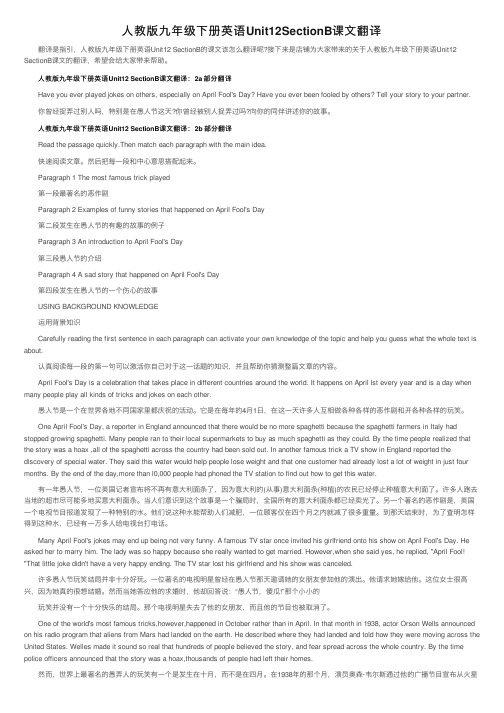
⼈教版九年级下册英语Unit12SectionB课⽂翻译 翻译是指引,⼈教版九年级下册英语Unit12 SectionB的课⽂该怎么翻译呢?接下来是店铺为⼤家带来的关于⼈教版九年级下册英语Unit12 SectionB课⽂的翻译,希望会给⼤家带来帮助。
⼈教版九年级下册英语Unit12 SectionB课⽂翻译:2a 部分翻译 Have you ever played jokes on others, especially on April Fool's Day? Have you ever been fooled by others? Tell your story to your partner. 你曾经捉弄过别⼈吗,特别是在愚⼈节这天?你曾经被别⼈捉弄过吗?向你的同伴讲述你的故事。
⼈教版九年级下册英语Unit12 SectionB课⽂翻译:2b 部分翻译 Read the passage quickly.Then match each paragraph with the main idea. 快速阅读⽂章。
然后把每⼀段和中⼼意思搭配起来。
Paragraph 1 The most famous trick played 第⼀段最著名的恶作剧 Paragraph 2 Examples of funny stories that happened on April Fool's Day 第⼆段发⽣在愚⼈节的有趣的故事的例⼦ Paragraph 3 An introduction to April Fool's Day 第三段愚⼈节的介绍 Paragraph 4 A sad story that happened on April Fool's Day 第四段发⽣在愚⼈节的⼀个伤⼼的故事 USING BACKGROUND KNOWLEDGE 运⽤背景知识 Carefully reading the first sentence in each paragraph can activate your own knowledge of the topic and help you guess what the whole text is about. 认真阅读每⼀段的第⼀句可以激活你⾃⼰对于这⼀话题的知识,并且帮助你猜测整篇⽂章的内容。
Unit 12 Gender Bias in Language课文翻译综合教程一.
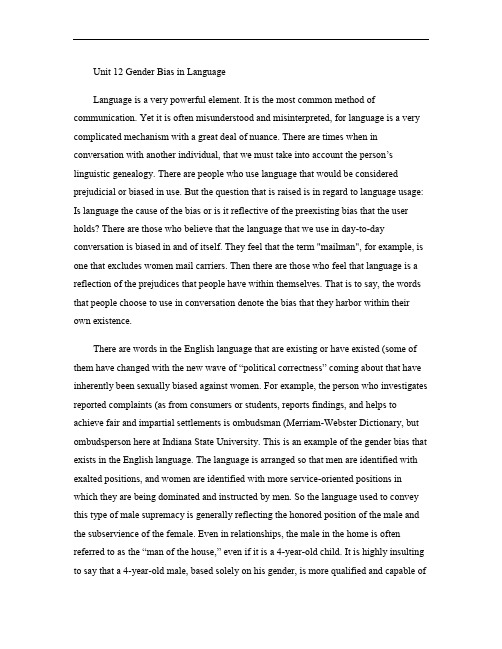
Unit 12 Gender Bias in LanguageLanguage is a very powerful element. It is the most common method of communication. Yet it is often misunderstood and misinterpreted, for language is a very complicated mechanism with a great deal of nuance. There are times when in conversation with another individual, that we must take into account the person’s linguistic genealogy. There are people who use language that would be considered prejudicial or biased in use. But the question that is raised is in regard to language usage: Is language the cause of the bias or is it reflective of the preexisting bias that the user holds? There are those who believe that the language that we use in day-to-day conversation is biased in and of itself. They feel that the term "mailman", for example, is one that excludes women mail carriers. Then there are those who feel that language is a reflection of the prejudices that people have within themselves. That is to say, the words that people choose to use in conversation denote the bias that they harbor within their own existence.There are words in the English language that are existing or have existed (some of them have changed with the new wave of “political correctness” coming about that have inherently been sexually biased against women. For example, the person who investigates reported complaints (as from consumers or students, reports findings, and helps to achieve fair and impartial settlements is ombudsman (Merriam-Webster Dictionary, but ombudsperson here at Indiana State University. This is an example of the gender bias that exists in the English language. The language is arranged so that men are identified with exalted positions, and women are identified with more service-oriented positions in which they are being dominated and instructed by men. So the language used to convey this type of male supremacy is generally reflecting the honored position of the male and the subservience of the female. Even in relationships, the male in the home is often referred to as the “man of the house,” even if it is a 4-year-old child. It is highly insulting to say that a 4-year-old male, based solely on his gender, is more qualified and capable ofconducting the business and affairs of the home than his possibly well-educated, highly intellectual mother. There is a definite disparity in that situation.In American culture, a woman is valued for the attractiveness of her body, while a man is valued for his physical strength and his achievements. Even in the example of word pairs the bias is evident. The masculine word is put before the feminine word, as in the examples of Mr. and Mrs., his and hers, boys and girls, men and women, kings and queens, brothers and sisters, guys and dolls, and host and hostess. This shows that the usage of many of the English words is also what contributes to the bias present in the English language.Alleen Pace Nilsenn notes that there are instances when women are seen as passive while men are active and bring things into being. She uses the example of the wedding ceremony. In the beginning of the ceremony, the father is asked who gives the bride away and he answers, “I do.” It is at this point that Nilsen argues that the gender bias comes into play. The traditional concept of the bride as something to be handed from one man (the father to another man (the husband-to-be is perpetuated. Another example is in the instance of sexual relationships. The women becomebrides while men wed women. The man takes away a woman’s virginity and a woman loses her virginity. This denotes her inability, apparently due to her gender, to hold on to something that is a part of her, thus enforcing the man’s ability and right to claim something that is not his.To be a man, according to some linguistic differences, would be considered an honor. To be endowed by genetics with the encoding of a male would be as having been shown grace, unmerited favor. There are far greater positive connotations connected with being a man than with being a woman. Nilsen yields the example of “shrew” and “shrewd.” The word “shrew” is taken from the name of a small but especially vicious animal; however in Nilsen’s dictionary, a “shrew” was identified as an “ill-tempered,scolding woman.” However, the word “shrewd,” which comes from the same root, was defined as “marked by clever discerning awareness.” It was noted in her dictionary as a shrewd businessman. It is also commonplace not to scold little girls for being “tomboys” but to scoff at little boys who play with dolls or ride girls’ bicycles.In the conversations that come up between friends, you sometimes hear the words “babe,” “broad,” and “chick.” These are words that are used in reference to or directed toward women. It is certainly the person’s right to use these words to reflect women, but why use them when there are so many more to choose from? Language is the most powerful tool of communication and the most effective tool of communication. It is also the most effective weapon of destruction.Although there are biases that exist in the English language, there has been considerable change toward recognizing these biases and making the necessary changes formally so that they will be implemented socially. It is necessary for people to make the proper adjustments internally to use appropriate language to effectively include both genders. We qualify language. It is up to us to decide what we will allow to be used and made proper in the area of language.语言中的性别偏见语言是一个非常强大的元素。
- 1、下载文档前请自行甄别文档内容的完整性,平台不提供额外的编辑、内容补充、找答案等附加服务。
- 2、"仅部分预览"的文档,不可在线预览部分如存在完整性等问题,可反馈申请退款(可完整预览的文档不适用该条件!)。
- 3、如文档侵犯您的权益,请联系客服反馈,我们会尽快为您处理(人工客服工作时间:9:00-18:30)。
In the rich world the idea of progress has become impoverished. Through complacency and bitter experience, the scope of progress has narrowed. The popular view is that, although technology and GDP advance, morals and society are treading water or, depending on your choice of newspaper, sinking back into decadence and barbarism. On the left of politics these days, “progress”comes with a pair of ironic quotation marks attached; on the right, “progressive”is a term of abuse. 在一个富裕的世界,关于进步的观念则变得贫困。
现状引起的自满和经历带来的痛苦都使得进步的视野越变越狭窄。
取决于你爱看哪种立场的报纸,流行的看法是:尽管科技和GDP 发展了,道德与社会却停滞不前,甚至可说是,正在向颓废和野蛮沉沦。
在当今政治的左翼,“进步”这两个字必定带有讽刺性的引号;而对于政治的右翼,“进步人士”也是一个被滥用的术语。
It was not always like that. There has long been a tension between seeking perfection in life or in the afterlife. Optimists in the Enlightenment and the 19th century came to believe that the mass of humanity could one day lead happy and worthy lives here on Earth. Like Madach’s Adam, they were bursting with ideas for how the world might become a better place.情况也并非一直都是这样糟糕。
长久以来,是求今生圆满,还是求来世完美,一直是不可得兼的难题。
18世纪启蒙运动和19世纪中的乐观主义者相信在全人类总有一天能够在地球上过上幸福和有价值的生活。
他们对如何改进世界充满了各种想法。
Some thought God would bring about the New Jerusalem, others looked to history or evolution. Some thought people would improve if left to themselves, others thought they should be forced to be free; some believed in the nation, others in the end of nations; some wanted a perfect language, others universal education; some put their hope in science, others in commerce; some had faith in wise legislation, others in anarchy. Intellectual life was teeming with grand ideas. For most people, the question was not whether progress would happen, but how.一些人认为上帝应该带来一个新的耶路撒冷,另一些人则想从历史或进化论里查找答案。
有些人认为人民在放任的状态下会自求改善,另一些人则认为只有施加压力人民才会去争取自由;有些人寄希望于民族国家,另一些人则希望民族国家的终结;一些人想要一种完美的语言,另一些人则看重全民教育;一些人将希望寄托于科学,另一些则寄托于商业;有人忠于英明的立法,有人则倾向无政府主义。
知识分子的生命充满了宏大的思考。
对于大多数人,问题不是进步是否发生,而是怎如何发生。
The idea of progress forms the backdrop to a society. In the extreme, without the possibility of progress of any sort, your gain is someone else’s loss. If human behaviour is unreformable, social policy can only ever be about trying to cage the ape within. Society must in principle be able to move towards its ideals, such as equality and freedom, or they are no more than cant and self-delusion. So it matters if people lose their faith in progress. And it is worth thinking about how to restore it.关于进步的观念形成了一个社会的大背景。
推到极端,如果一点进步都做不到,利己就必损人。
如果人类的行为不可改造,(那么人同猿人并无差别),社会政策就永远只能是为了把这个猿人关在笼子里。
原则上讲,社会必须能够朝着完美典范前进,诸如自由和平等,否则那些典范就是伪善和自欺欺人。
因此,如果人们对进步失去信念,问题就大了。
如何拾回失去的信念就很值得思考。
Cain and cant该隐(译者注:圣经中亚当和夏娃的长子,出于嫉妒杀害了他的兄弟亚伯,最后被流放) 和伪善By now, some of you will hardly be able to contain your protests. Surely the evidence of progressis all around us? That is the case put forward in “It’s Getting Better All the Time”, by the late Julian Simon and Stephen Moore then at the Cato Institute, a libertarian think-tank in Washington, DC. Over almost 300 pages they show how vastly everyday life has improved in every way.行文至此,你们中很多人会忍不住反对。
难道我们周围不都是进步的明证吗?这就是“情况一直变得越来越好”这本书提出的论点。
这本书的作者是已故的Julian Simon and Stephen Moore,当时被聘于华盛顿自由主义者智库卡托研究所。
他们用了几乎300页来描写日常生活如何在各方面都取得巨大的进步。
For aeons people lived to the age of just 25 or 30 and most parents could expect to mourn at least one of their children. Today people live to 65 and, in countries such as Japan and Canada, over 80; outside Africa, a child’s death is mercifully rare. Global average income was for centuries about $200 a year; a typical inhabitant of one of the world’s richer countries now earns that much in a day. In the Middle Ages about one in ten Europeans could read; today, with a few exceptions, such as India and parts of Africa, the global rate is comfortably above eight out of ten. In much of the world, ordinary men and women can vote and find work, regardless of their race. In large parts of it they can think and say what they choose. If they fall ill, they will be treated. If they are innocent, they will generally walk free.古代人类只能活到25-30岁,绝大多数父母都会失去至少一个孩子。
而今天人类能活到65岁,在有些国家如日本和加拿大,平均寿命超过了80岁;非洲以外的地区,鲜有儿童死亡。
几个世纪以来全球年人均收入为200美元;而如今这个数字仅仅是典型富国居民一天的收入。
中世纪,十个欧洲人里有一个能够阅读;今天,除了印度和非洲的一些地区极个别例外,全球识字率在80%以上。
世界上多数地区,一般的公民无论种族都有投票和工作的权利。
他们中的大多数有言论自由。
病人能够获得医疗,无罪的人拥有人身自由。
It is good to go up in the world, but much less so if everyone around you is going up in it too. 在社会上获得更高的地位是好的,但是如果你身边的每个人都这样,就不那么好了.It is an impressive list—even if you factor in some formidably depressing data.这是一份令人印象深刻的清单——即使是考虑到一些极其令人沮丧的数据。
